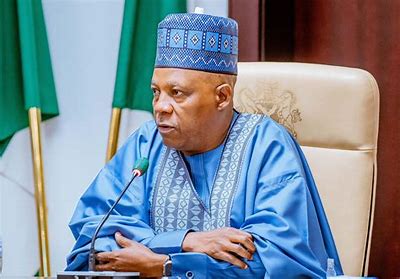Vice President Kashim Shettima has provided insight into why Nigeria has one of the lowest tax-to-GDP ratios globally. Speaking on Friday in Abuja at the 2nd Joint Workshop on the 2025 National Budget, organized by the Association of National Accountants of Nigeria (ANAN) and the Chartered Institute of Taxation of Nigeria (CITN), Shettima attributed the low ratio to a long-standing culture in Nigeria where many citizens have perfected the art of hiding their wealth from the government.
Represented by Dr. Tope Fasua, the Special Adviser to the President on Economic Affairs, Shettima addressed the workshop, which was themed “2025 National Budget: A Budget for Restoration and Aligning Resources for Sustainable National Development.”
In his remarks, Shettima explained, “National budgets are among the most significant financial documents for any country. They guide businesses, households, and individuals by offering insights into the government’s thinking, providing critical data that shapes business strategies and household budgets. Nigeria, despite its immense potential, has become a nation where many have perfected the art of hiding wealth from the government. This is a key reason for our low tax-to-GDP ratio.”
He emphasized the vast potential for prosperity within Nigeria, stating that this prosperity should be harnessed to advance the nation’s growth. He urged citizens to invest in the country rather than sending hard-earned money abroad. “Enough of sending money overseas to acquire assets when we have pressing development needs here. The returns on investments in Nigeria are often much higher than abroad, and there is the added benefit of contributing to our national growth,” Shettima added.
He further addressed the issue of financial malpractices, urging the public to pay their taxes fairly, especially as the government has reduced tax rates and does not focus on turnover but rather on profits after legitimate expenses. He stressed that the government should not be seen as an adversary, but as a partner in national development.
Shettima also discussed the upcoming 2025 budget, which is valued at N54.99 trillion. He stated that the budget aims to reduce leakages, improve value for money, and prioritize critical infrastructure and human capital development. The budget also seeks to address Nigeria’s growing debt burden, with a projected deficit of N13 trillion, which will be financed through a mix of public-private partnerships and both local and foreign borrowing.
Earlier, the President and Chairman of the CITN, Mr. Samuel Agbeluyi, highlighted the importance of collaboration between professional bodies in shaping Nigeria’s fiscal policies. He pointed out that the 2025 budget marks a significant shift in fiscal policy, with an allocation of N54.99 trillion—an increase of 56.89% from the 2024 budget. This sharp increase necessitates a comprehensive review of revenue projections and expenditure allocations. Agbeluyi also emphasized the importance of evaluating debt servicing, which is set at N16.3 trillion, up from N12.3 trillion in 2024, and assessing its implications on fiscal sustainability.
Dr. James Neminebor, President of ANAN, emphasized the need for a strategic blueprint that aligns with the aspirations of the Nigerian people and supports sustainable national development. He underscored the importance of effective budget implementation, transparency, and accountability in public resource management.
Minister of Budget and Economic Planning, Senator Abubakar Atiku Bagudu, spoke on the challenge of addressing decades of underinvestment. He stressed the need for a macroeconomic environment that promotes growth and development across sectors, including food security, infrastructure, and energy. Bagudu also touched on the necessity of removing subsidies, despite the challenges they may pose, and reforming economic distortions to ensure fiscal stability. He noted that, while Nigeria’s budget of N54 trillion represents approximately 13-14% of the country’s GDP, it is important to evaluate whether this figure is sufficient for the country’s needs.
As Nigeria navigates these complex fiscal challenges, the collaboration of financial professionals and stakeholders will be crucial to shaping a sustainable and prosperous future for the nation.

